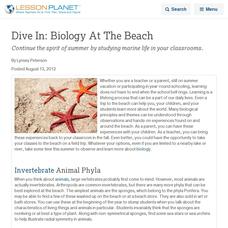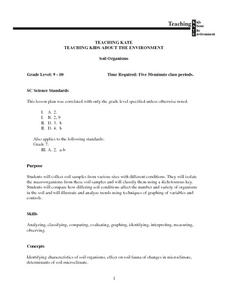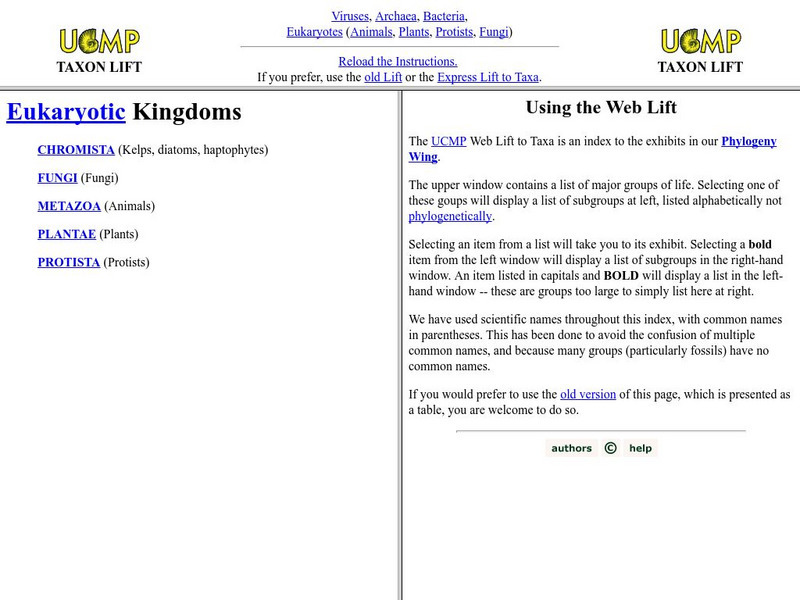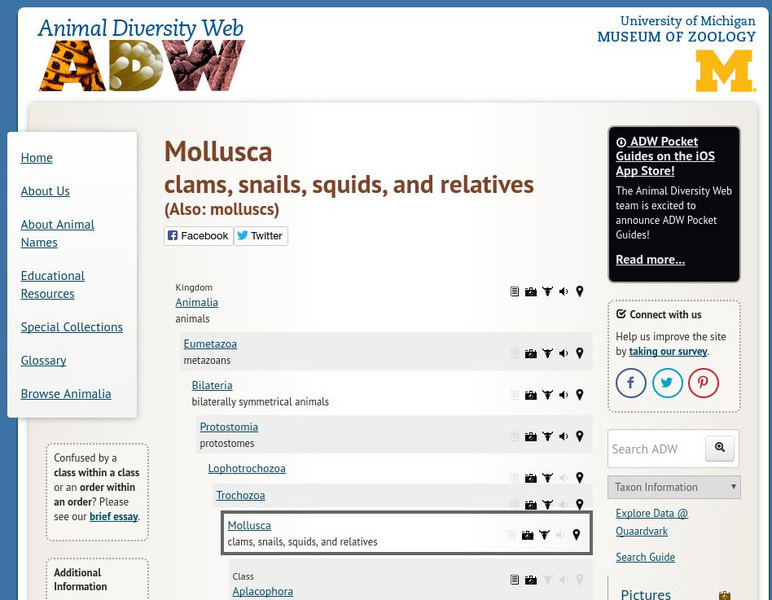Curated OER
Kingdom Animalia
Learners are introduced to the basic characteristics of the animal kingdom. this lesson is part of a multi-segmented unit on the diversity of life. For this segment, students explore the the members of a few phyla of the animal kingdom.
Curated OER
Bug's Eye View
Investigate the life of bugs and how they interact with the environment in this integrated science and language arts instructional activity. Young scientists construct mini environments in cages in order to make observations. This data...
Curated OER
Dive In: Biology At The Beach
Continue the spirit of summer by studying marine life in your classrooms.
Curated OER
Amphibians-Frog Dissection
Students compare the anatomy of a fish to an amphibian and that of an amphibian (frog) to a human. They complete a virtual frog dissection to gain some experience prior to the real dissection.
Curated OER
Invertebrate Vocabulary-- Marine Invertebrate Match
In this science worksheet, young scholars study 12 vocabulary words which pertain to marine invertebrates. Students read the definitions which include pronunciation, part of speech and meaning of the name. Young scholars then look at 16...
Curated OER
Creating a Classification System
Students create classification system for Arctic-dwelling animals, the Arctic hare in particular.
Curated OER
Embryology as Evidence of Evolution
Students observe the two major developmental pathways (protostome and deuterostome). They analyze data regarding differences in nucleotide sequences and construct a phylogenetic tree. They observe the similar evolutionary history shared...
Curated OER
Halloween: Arachnids
Students participate in class discussion about the movie Arachnophobia. In this biology lesson, students find articles and photos of a species that interest them. They share it with their group.
Curated OER
Zoology Word Search Puzzle
In this science worksheet, learners look for the words that are related to the concept of zoology that is reviewed in the sheet. They also acquire new vocabulary.
Curated OER
Soil Organisms
Students work together to collect soil samples from different locations. In the samples, they identify the macroorganisms and classify them. They identify the conditions that affect how macroorganisms grow. They also analyze and identify...
Curated OER
Goals of the Diversity of Life Unit
Students are introduced to the unit on the importance of diversity of life and the role that interdependence plays in our worlds. this is part of a multi-lesson unit on the diversity of life.
Curated OER
Ancient Creature of the Deep
Students compare and contrast the coelacanth, a living fossil, with a moray eel and a bull shark. They complete a Fish Anatomy worksheet while researching the skeleton, body coverings and buoyancy of each fish.
Curated OER
Seashore Limitations
Students demonstrate the movements and behaviors of creatures from different parts of the ocean.
University of California
Ucmp: Web Lift to Taxa
Alphabetical listing from the University of California of info on each of the animal phyla. Includes scientific and common names and photos. Characteristics of each group are explained in detail.
PBS
Pbs: The Shape of Life: Activities and Resources: Phylum Comparison [Pdf]
Students explore eight major phyla of the animal kingdom by comparing body plans, animal behavior, evolution, reproduction, and more. Includes a one-page reference to characteristics by phylum.
Regents of the University of Michigan
Animal Diversity Web: Phylum Mollusca (Mollusks)
A great, detailed description of mollusks. Discusses parts of their external and internal anatomy and their functions, and lists several characteristics of mollusks. Tabbed pages include pictures, specimens and classification.
Untamed Science
Untamed Science: Phylum Chordata
Learn about the characteristics, classification, and phylogeny that make the Phylum Chordata, a distinct animal classification group. See examples and photos of different species of chordates.
Regents of the University of Michigan
Animal Diversity Web: Phylum Chordata (Chordates)
This site contains a listing of additional characteristics that many Chordates have in common beyond the typical four: notochord, dorsal nerve cord, pharyngeal slits, and a post-anal tail.
Regents of the University of Michigan
Animal Diversity Web: Cnidaria
This site by Animal Diversity Web discusses the different body types and the similar characteristics of the animals in the phylum Cnidaria.
University of California
Ucmp: Introduction to Chordata
This site from UC Berkeley is an excellent site about the animal phylum chordata. Click on various sections to learn more, covering topics such as the fossil record, life history & ecology, systematics, and morphology. This site is a...
BiologyWise
Biology Wise: Characteristics of Arthropods
Describes general characteristics of Arthropoda and features of the different animal classes within this phylum.
BiologyWise
Biology Wise: Classification and Characteristics of Rotifers
Outlines the classification hierarchy of the phylum Rotifera and describes their characteristics and anatomy. Rotifera have survived for up to 80 million years and continue to play an important role in ecological systems.
Regents of the University of Michigan
Animal Diversity Web: Phylum Arthropoda
This general overview of the arthropod phylum, which includes insects and arachnids, looks at such topics as body symmetry, appendages, movement, respiratory and nervous systems, and reproduction.
Regents of the University of Michigan
Animal Diversity Web: Class Merostomata (Horseshoe Crab)
Find general information about the Merostomata class, which includes horseshoe crabs and the extinct eurypterids. Topics include diet, body charactersitics, and respiratory system.














![Pbs: The Shape of Life: Activities and Resources: Phylum Comparison [Pdf] Activity Pbs: The Shape of Life: Activities and Resources: Phylum Comparison [Pdf] Activity](https://content.lessonplanet.com/knovation/original/115994-9311c915222671f24d62d04783ca3890.jpg?1661495768)







